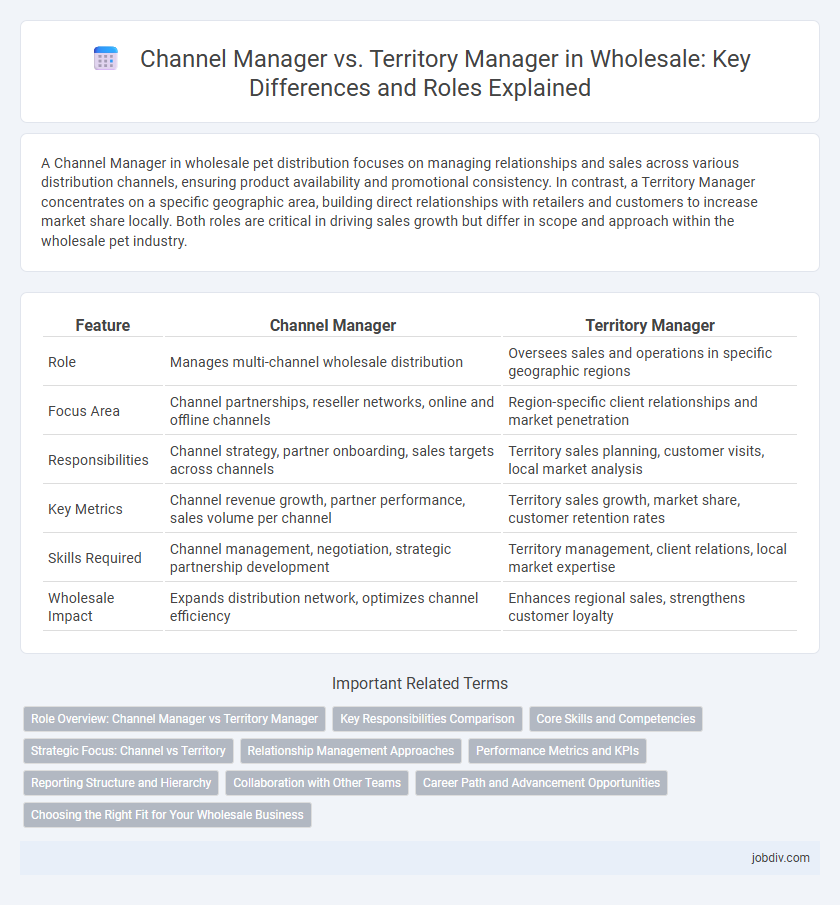A Channel Manager in wholesale pet distribution focuses on managing relationships and sales across various distribution channels, ensuring product availability and promotional consistency. In contrast, a Territory Manager concentrates on a specific geographic area, building direct relationships with retailers and customers to increase market share locally. Both roles are critical in driving sales growth but differ in scope and approach within the wholesale pet industry.
Table of Comparison
| Feature | Channel Manager | Territory Manager |
|---|---|---|
| Role | Manages multi-channel wholesale distribution | Oversees sales and operations in specific geographic regions |
| Focus Area | Channel partnerships, reseller networks, online and offline channels | Region-specific client relationships and market penetration |
| Responsibilities | Channel strategy, partner onboarding, sales targets across channels | Territory sales planning, customer visits, local market analysis |
| Key Metrics | Channel revenue growth, partner performance, sales volume per channel | Territory sales growth, market share, customer retention rates |
| Skills Required | Channel management, negotiation, strategic partnership development | Territory management, client relations, local market expertise |
| Wholesale Impact | Expands distribution network, optimizes channel efficiency | Enhances regional sales, strengthens customer loyalty |
Role Overview: Channel Manager vs Territory Manager
Channel Managers oversee relationships with distribution partners, optimizing sales strategies across multiple channels to maximize market coverage and revenue. Territory Managers focus on direct sales, managing customer accounts within specific geographic regions to drive growth and ensure customer satisfaction. Both roles require strategic planning and strong communication skills but differ in scope, with Channel Managers handling partner networks and Territory Managers concentrating on localized market penetration.
Key Responsibilities Comparison
Channel Managers oversee relationships with distribution partners, managing sales channels to maximize product reach and optimize supply chain efficiency. Territory Managers are responsible for sales activities within specific geographic areas, focusing on customer acquisition, retention, and market penetration. Both roles require strategic planning, performance analysis, and coordination with marketing teams to drive revenue growth in wholesale markets.
Core Skills and Competencies
Channel Managers excel in partnership development, strategic sales planning, and multi-channel distribution coordination, ensuring optimized product flow through various wholesalers and retailers. Territory Managers specialize in market analysis, customer relationship management, and targeted sales execution within designated geographic areas to drive regional revenue growth. Both roles require strong communication, negotiation, and analytical skills but differ in their focus on channel optimization versus localized market penetration.
Strategic Focus: Channel vs Territory
Channel Managers concentrate on optimizing sales and relationships across multiple distribution channels, leveraging partnerships to maximize market coverage and efficiency. Territory Managers focus strategically on a specific geographic area, tailoring sales efforts and customer engagement to local market dynamics and regional customer needs. This distinction drives resource allocation, performance metrics, and growth strategies aligned with either channel expansion or territory penetration.
Relationship Management Approaches
Channel Managers optimize relationships by coordinating multiple sales channels and partners, ensuring consistent brand messaging and streamlined communication. Territory Managers focus on building deep, localized relationships with clients within specific geographic areas, tailoring strategies to regional market dynamics. Both roles employ relationship management approaches, but Channel Managers prioritize cross-channel synergy while Territory Managers concentrate on personalized, territory-specific engagement.
Performance Metrics and KPIs
Channel Managers optimize sales performance by tracking KPIs such as channel sales growth, partner engagement rates, and inventory turnover. Territory Managers focus on metrics including territory sales volume, customer acquisition rates, and lead conversion efficiency to drive regional revenue. Both roles rely on data-driven performance metrics to enhance market penetration and operational effectiveness in wholesale distribution.
Reporting Structure and Hierarchy
Channel Managers typically oversee multiple sales channels and report to regional or sales directors, ensuring alignment across distribution partners and retail outlets. Territory Managers operate within a defined geographic area, reporting directly to district or regional managers, with a focus on localized sales performance and customer relationships. The hierarchy places Channel Managers at a higher strategic level, coordinating broad channel strategies, while Territory Managers execute tactical sales initiatives within assigned territories.
Collaboration with Other Teams
Channel Managers drive collaboration by coordinating with marketing, sales, and distribution teams to optimize product availability across various sales channels. Territory Managers work closely with regional sales, customer service, and logistics teams to tailor strategies that address specific market conditions and customer needs. Effective collaboration between both roles ensures seamless communication, improved market penetration, and enhanced customer satisfaction in wholesale operations.
Career Path and Advancement Opportunities
Channel Managers typically advance by expanding their portfolio of partner relationships and gaining expertise in multi-channel distribution strategies, positioning themselves for senior roles in sales or business development. Territory Managers often progress by demonstrating strong local market knowledge and direct sales success, leading to regional management or sales director roles. Both career paths offer opportunities for leadership, but Channel Managers usually move towards strategic partnerships, while Territory Managers focus on operational and frontline sales management.
Choosing the Right Fit for Your Wholesale Business
Choosing between a Channel Manager and a Territory Manager depends on your wholesale business's distribution strategy and market coverage needs. A Channel Manager optimizes relationships with multiple sales channels such as distributors, retailers, and e-commerce platforms, ensuring efficient product flow and consistent branding across channels. In contrast, a Territory Manager focuses on a specific geographic area, driving sales and customer relationships directly within that region to maximize market penetration and responsiveness.
Channel Manager vs Territory Manager Infographic

 jobdiv.com
jobdiv.com